Ultra Course View
Introduction
Blackboard Learn, UIC’s learning management system, has made significant improvements in functionality over the past several years. One of those improvements has been the addition of the Ultra course view. While most instructors at UIC are still using the Original Course View, instructors now have the option to adopt the Ultra Course View.
The Ultra Course View has a more modern design and easy-to-use interface with some new tools that are not available in the Original Course View, like Progress Tracking and Discussion Analytics. However, some Original Course View functionality has been discontinued in the Ultra Course View. Many early adopters have been attracted to the new features in Ultra.
This page highlights the benefits and considerations to make before deciding to use the Ultra Course View.
ultra course view
It is so good to be able to set the gradebook category right as you make the assignment instead of afterward having to go into the gradebook to do it!
Learn about Blackboard Learn
more info
AVAILABLE TO: Faculty | Students | Staff
FUNDING: University
features
Advanced Sorting and Filtering
The Ultra Course View gradebook leaves the Original View’s Grade Center search problems behind. View by multiple variables like users, groups, items, and categories in a list or a grid. Multiple filters can be used on demand. The filters applied can also be bookmarked and accessed later.
Assignments and Rubrics
If you love creating rubrics to support student understanding of assignment expectations then you will enjoy the ability to create rubrics directly in assignments using the Ultra experience. Ultra also improves the visibility of rubrics for students, ensuring that they understand the requirements and expectations of the assignment.
3
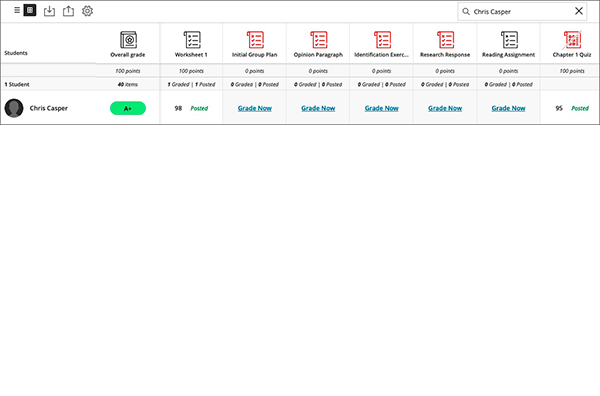
figure 1: Advanced Sorting and Filtering
4
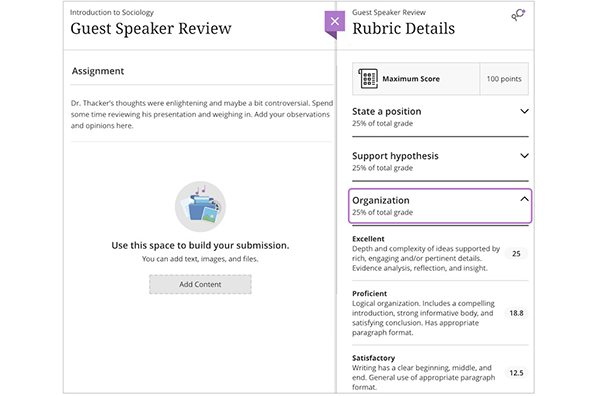
figure 2: Assignments and Rubrics
Progress Tracking
Ultra has an exciting new capability that helps students identify the tasks they have started, completed, or haven’t interacted with. Submitted assessments get marked automatically, and future software updates will provide instructors the ability to monitor student progress inside their courses.
Discussion Analysis
Experience an in-depth look at each student’s discussion participation using multiple metrics. These performance-based insights show you which students may need help, or are out of the typical range of participation. The discussion analysis algorithm focuses on a student’s content and provides details to help you evaluate participation. There is also an automated word count and features that analyze the meaningfulness of the writing.
7
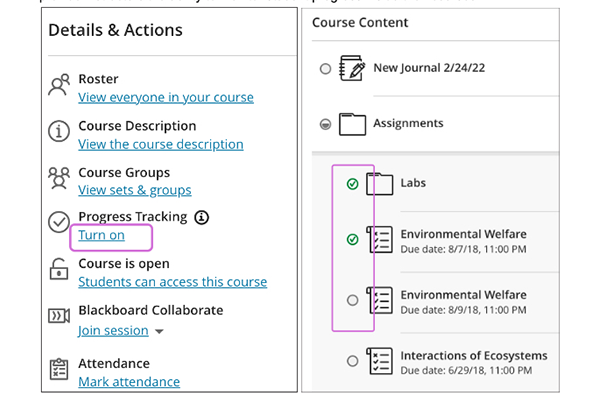
figure 3: Progress Tracking
8
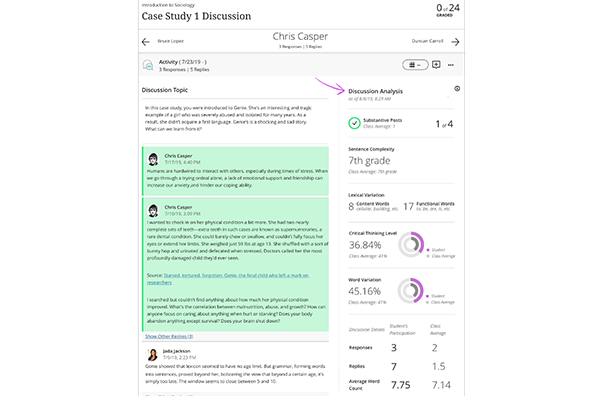
figure 4: Discussion Analysis
Group Discussions
Manage your discussions on the activity instead of in individual groups. There is no longer a need to create a separate group discussion. The discussion is created first, and then groups are added to it. Students can see their group members on the discussion itself, and group discussions can be easily managed within a single grading interface.
10
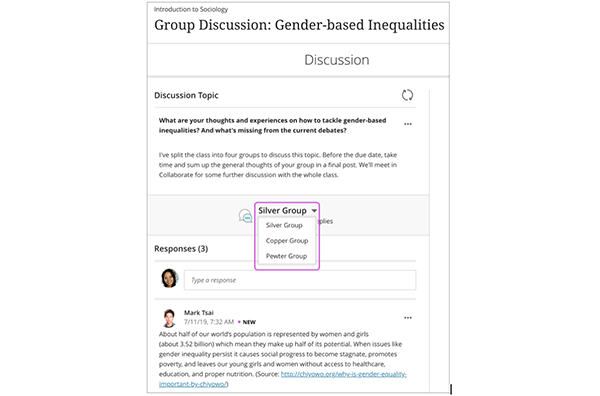
figure 5: Group Discussions
compare
Instructors and students can experience Blackboard Learn in two different ways: Original Course View and Ultra Course View.
Original Course View
The Original Course View has four main navigational elements: tabs,orientation bar, and a left panel where users access items in courses.
The left panel contains your course menu. You create links on the course menu to present tools and materials to students. The area below the course menu is the Control Panel. You can access the Grade Center and your file repository, and choose which course tools to use. Content appears in the main window to the right of the course menu.
Ultra Course View
The Ultra Course View has a single navigational approach: left navigation that opens layers one on top of the other as users navigate through a course. Select the plus sign on the Course Content page wherever you want to create content. All of your course content appears in the main part of the page. When you open a piece of content, it slides out in a layer on top of the Course Content page. Close layers to go back to a previous spot in your course.
3
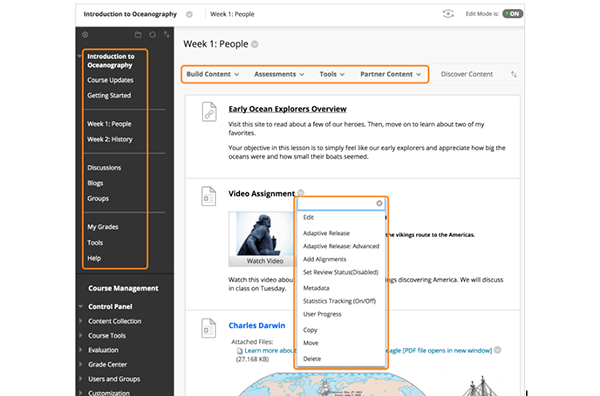
figure 1: Original Course View
4
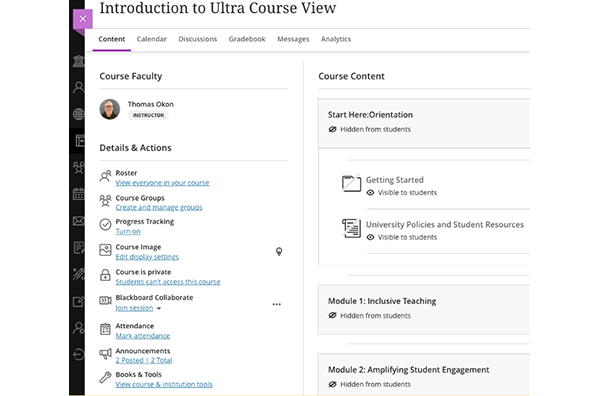
figure 2: Ultra Course View
which?
Below are listed some of the elements of each course view that may be important when considering which course view is right for you. If you have questions, you can email LTS@uic.edu to schedule a consultation.
Features of the Original Course View
The Original Course View contains many of the advanced tools and workflows that experienced instructors have become accustomed to. If you are new to Blackboard Learn or a new UIC instructor, you might find that Original View takes significant time to learn and is not typical of modern interface design. Some highlights include:
- Assortment of assessment options. Instructors use tests and quizzes to assess students’ learning and their ability to think critically. They can use different types of questions to learn more about a student’s understanding in a way that fits the course or assessment.
- Delegated and anonymous grading. Instructors lighten their grading workload by assigning other users in a course to grade sets of student submissions. Instructors can also enable anonymous grading to avoid potential grading bias.
- Proven tools. In the Original Course View, instructors can use the tools they’re familiar with to communicate with students in different ways, such as wikis, surveys, journals, and blogs.
2
The Ultra Course View is a modern and straight forward course experience for instructors and students. Instructors and students need little experience with Blackboard to find and use the tools available, but more experienced users may find the Ultra Course View limits their ability to customize their courses. Some highlights include:
- Mobile-friendly. The Ultra Course View adapts to the size of users’ screens whether they view courses on a mobile phone, tablet, or desktop computer. Users can access their courses on the go and when convenient.
- Simplified workflows. A more natural workflow for adding course content enables instructors to simply select the plus sign to add content. The system walks you through the process to add assignments, discussions, links, and external content. Other common tasks, such as grading and sending messages, are simplified in the Ultra Course View as well.
- Improved navigation. No need to dig for course tools. At the top of your screen, you’ll find content, events, discussions, grades, and messages, no matter where you are in the course.
How do I start the Ultra Course View redesign process?
1
If you are ready to take the next step in creating a course in Ultra View, please make an appointment with LTS. During the scheduled consultation, we will discuss the differences between the two views as well as help you determine whether Ultra View meets your course vision and goals. Email LTS@uic.edu to schedule your consultation.
We understand it’s not easy re-designing your course, so you may need to consider if you have time to devote to adopting Ultra Course View. Most of the instructors that were early adopters took the opportunity to rethink the structure and delivery of their course materials and decided to start with a blank course.
2
Ultimately the choice is yours, but please be assured that the LTS team will work collaboratively with you to ensure your success.
1
Session 1: Learn Ultra Course Seminar
Access Session 1 Recording:
https://uofi.app.box.com/file/1051203477683?s=jnrtl4x6ttgvda8med5qijglok78x1bg
Session 2: Learn Ultra Course Seminar
Access Session 2 Recording:
https://uofi.app.box.com/file/1051199707653?s=5jgre700yfy5gxoo1v6sv4sma8pkne5k
3
4
Blackboard Ultra Guides
Add Content
- Create Documents
- Add a Syllabus
- Course Links
- Work with Text
- Add YouTube Video
- Add Files, Images, Audio, and Video
- Web Links
- Content Release Conditions
- Create and Edit Content in the Content Collection
- Cloud Document
Ultra Gradebook
- Ultra Gradebook
- Grade with Rubrics
- Delegated Grading
- Grade Group Assignments
- Grade Tests
- Bb Annotate
- Assign Grades
Assignments
5
Tests, Pools, and Surveys
Engagement
SafeAssign
(Original and Ultra course views are discussed on the same page. Scroll until you find the section on the course view you are currently using)
Other Common Questions